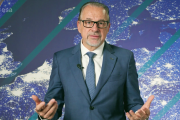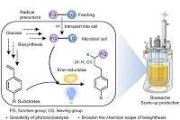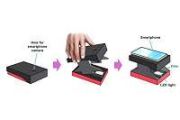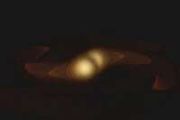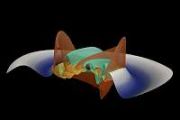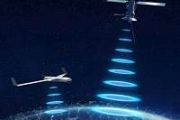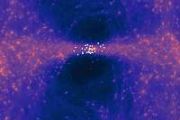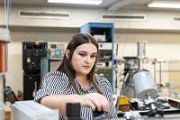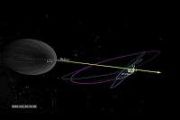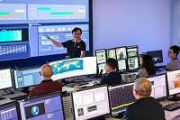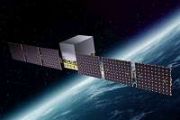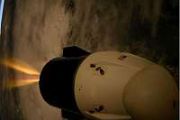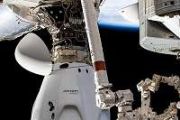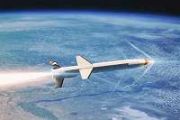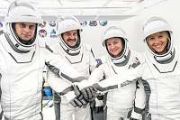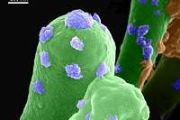
Copernical Team
ESA and CNES sign contract to maintain Spaceport, furthering modernisation and environmental sustainability
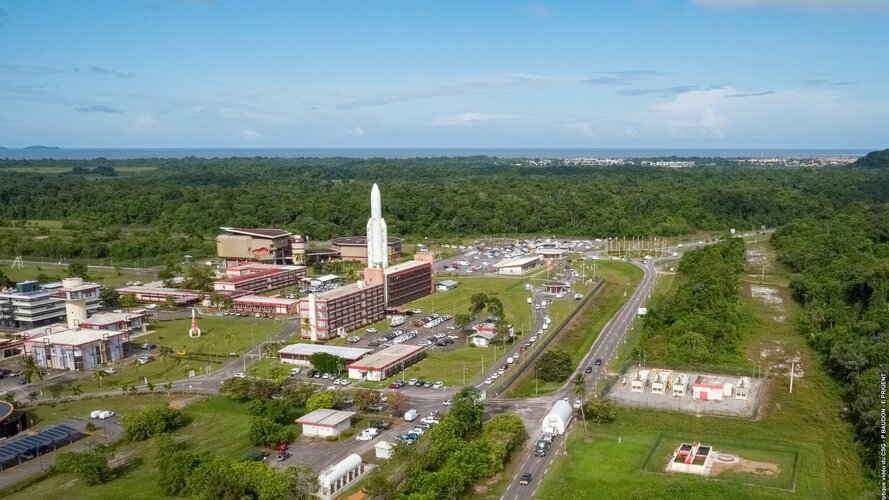
At the Paris air show today, ESA Director of Space Transportation Daniel Neuenschwander and CNES's Guiana Space Centre Director Marie-Anne Clair signed a contract, maintaining ESA’s role and focusing on objectives including improving flexibility to handle new payloads, reducing carbon footprint and furthering the digital transformation at Europe’s Spaceport to 2027. Looking on were ESA Director General Josef Aschbacher and CNES Deputy Chief Executive Lionel Suchet.
CNES has overall responsibility for maintaining the operational condition of the spaceport and modernizing facilities.
Paris Air Show live - From Earth science to climate action
Paris Air Show live: From Earth science to climate action
22 June at 12:00 CEST: Earth's water and carbon cycles from space
Industry invited to bid for low-Earth orbit satnav demo
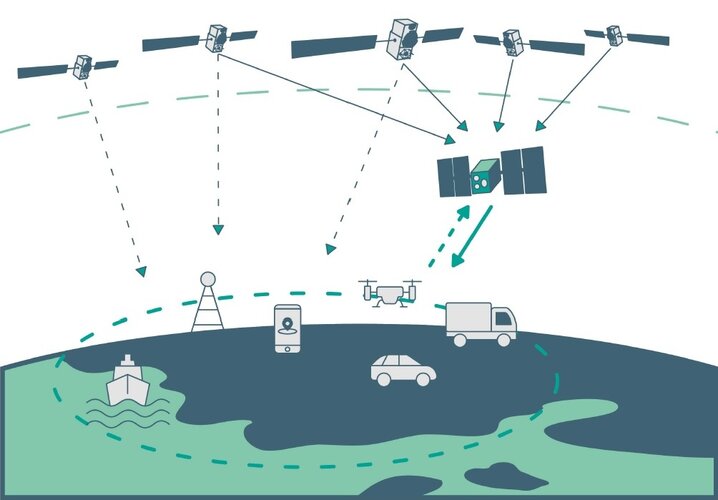
Europe’s Galileo constellation is already the world’s most accurate satellite navigation system, providing metre-level precision to users worldwide. The general expectation is that satnav is going to keep on getting better, in line with increasing user needs and accuracy requirements. But in fact, traditional Global Navigation Satellite Systems (GNSS) in medium Earth orbit are approaching their limits of technical performance.
Iridium proposes a new model for monitored BVLOS UAS integration
 Iridium Communications Inc. (NASDAQ: IRDM) has announced the results of an Uncrewed Aircraft System (UAS) flight trial highlighting Beyond Visual Line of Sight (BVLOS) capabilities in the National Airspace System (NAS), with a published a whitepaper titled "Monitored BVLOS: A New Model for UAS Integration in the National Airspace System." The whitepaper highlights and solves for challenges faced
Iridium Communications Inc. (NASDAQ: IRDM) has announced the results of an Uncrewed Aircraft System (UAS) flight trial highlighting Beyond Visual Line of Sight (BVLOS) capabilities in the National Airspace System (NAS), with a published a whitepaper titled "Monitored BVLOS: A New Model for UAS Integration in the National Airspace System." The whitepaper highlights and solves for challenges faced ESA backs Greek firms' and universities' CubeSats
 Seven CubeSat missions that demonstrate a variety of services including connectivity and secure communications are being developed by small and medium-sized companies and universities in Greece, following an open call and selection by ESA.
The initiative underpins efforts - led by ESA on behalf of the Greek Ministry of Digital Governance - to expand the nascent space industry in Greece, en
Seven CubeSat missions that demonstrate a variety of services including connectivity and secure communications are being developed by small and medium-sized companies and universities in Greece, following an open call and selection by ESA.
The initiative underpins efforts - led by ESA on behalf of the Greek Ministry of Digital Governance - to expand the nascent space industry in Greece, en Continuing along the alternate route: Sols 3861-3864
 Earth planning date: Friday, June 16, 2023 Hearing today's drive completed as planned for the third time in a row was a refreshing change from last week when Curiosity was struggling to get up a rocky and sandy slope. Our alternate route takes us laterally along this challenging terrain, rather than straight uphill, and this small change certainly seems to be helping.
I really hope we cont
Earth planning date: Friday, June 16, 2023 Hearing today's drive completed as planned for the third time in a row was a refreshing change from last week when Curiosity was struggling to get up a rocky and sandy slope. Our alternate route takes us laterally along this challenging terrain, rather than straight uphill, and this small change certainly seems to be helping.
I really hope we cont Rover on the home stretch to the Martian moon Phobos
 The origin of the martian moons Phobos and Deimos is still an unsolved mystery in planetary research. Both moons will be the targets of the Japanese Martian Moons eXploration (MMX) mission. A German-French rover will land on Phobos as part of the mission and conduct a mobile exploration - despite the extremely low gravity. At the Paris Air Show in Le Bourget, the Japan Aerospace Exploration Agen
The origin of the martian moons Phobos and Deimos is still an unsolved mystery in planetary research. Both moons will be the targets of the Japanese Martian Moons eXploration (MMX) mission. A German-French rover will land on Phobos as part of the mission and conduct a mobile exploration - despite the extremely low gravity. At the Paris Air Show in Le Bourget, the Japan Aerospace Exploration Agen Long March 6 rocket carries experimental satellite to space
 China used a Long March 6 carrier rocket to transport an experimental satellite into space on Tuesday morning, according to China Aerospace Science and Technology Corp, a leading State-owned space contractor.
The company said in a news release that the rocket blasted off at 11:18 am at the Taiyuan Satellite Launch Center in Shanxi province and soon placed the Shiyan 25 satellite into its p
China used a Long March 6 carrier rocket to transport an experimental satellite into space on Tuesday morning, according to China Aerospace Science and Technology Corp, a leading State-owned space contractor.
The company said in a news release that the rocket blasted off at 11:18 am at the Taiyuan Satellite Launch Center in Shanxi province and soon placed the Shiyan 25 satellite into its p OSIRIS-REx asteroid sample will have new home in Houston
 If everything goes according to plan, OSIRIS-REx's sample return capsule will separate from the spacecraft, enter the Earth's atmosphere and parachute safely to Earth for recovery at the Department of Defense's Utah Test and Training Range, located about 70 miles west of Salt Lake City. "The OSIRIS-REx curation team is excitedly preparing for the Bennu samples," said Nicole Lunning, OSIRIS-REx l
If everything goes according to plan, OSIRIS-REx's sample return capsule will separate from the spacecraft, enter the Earth's atmosphere and parachute safely to Earth for recovery at the Department of Defense's Utah Test and Training Range, located about 70 miles west of Salt Lake City. "The OSIRIS-REx curation team is excitedly preparing for the Bennu samples," said Nicole Lunning, OSIRIS-REx l New form of electromagnetic launch will reduce orbital costs by 100-fold
 Reducing orbital launch costs by 100-fold would be world changing, and that's what Electromagnetic Launch Inc. (EML) and Robinson Research Institute of Victoria University of Wellington in New Zealand aim to do in a new partnership agreement and demonstration experiment announced May 30, 2023.
The partners intend to prove the physics and demonstrate the engineering for a "Quench Launcher,"
Reducing orbital launch costs by 100-fold would be world changing, and that's what Electromagnetic Launch Inc. (EML) and Robinson Research Institute of Victoria University of Wellington in New Zealand aim to do in a new partnership agreement and demonstration experiment announced May 30, 2023.
The partners intend to prove the physics and demonstrate the engineering for a "Quench Launcher," 


